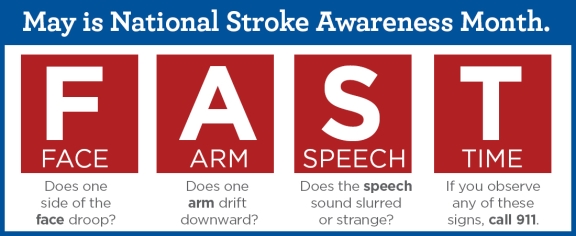May is National Stroke Awareness Month! According to the CDC, strokes kill nearly 150,000 Americans each year! That’s 1 in every 19 deaths and is the 5th leading cause of death in the U.S. A stroke causes brain tissue to die and can lead to brain damage, disability, or death. A stroke happens in one of two ways:
- Ischemic Stroke- blood supply is to the brain is blocked.
- Hemorrhagic Stroke- blood vessel in the brain bursts.
The good news is that there is hope to this health problem, because it is estimated that 80% of strokes are preventable by making some lifestyle changes and controlling blood pressure and cholesterol levels. And since nearly 800,000 people in the U.S. have a stroke each year and many are recurrent for people, it is important to work on controlling any risk factors to prevent them. Controllable risk factors include no smoking, limiting alcohol, getting enough exercise, eating healthy diet of fruits and vegetables and low in sodium, and controlling blood pressure and cholesterol levels.
It is also important to know what to look for or what to do if you suspect a stroke is happening. Remember to act F.A.S.T. and watch for the following:
- F- FACE DROOPING
Ask the person to smile. Does one side droop?
- A- ARM WEAKNESS
Ask the person to raise both arms. Does one arm drift downward?
- S- SPEECH DIFFICULTY
Ask the person to repeat a simple sentence. Are the words slurred?
- T- TIME to CALL 9-1-1
If the person shows any of these signs, call 9-1-1 immediately!

Other common signs of stroke include: sudden dizziness; trouble walking or loss of balance and coordination; sudden trouble seeing; sudden, severe headache; numbness of face, arm, or leg; sudden confusion or trouble understanding. Strokes are a medical emergency and treatment and outcomes depend on how fast you can get treatment by ambulance or to a hospital for help.
Strokes are diagnosed with testing that may include imaging studies such as a CT-scan or MRI. Treatment may include rehabilitation and therapy depending upon the severity of the stroke and lifestyle changes or medications may be needed to prevent reoccurrence.
It’s important to regularly see your doctor to evaluate your stroke risk factors and make a plan for any needed medications and to stay healthy. For more questions about stroke or to schedule an annual physical, please call us for an appointment at the Power County Family Clinic at 226-1057.
